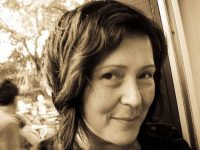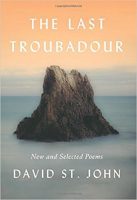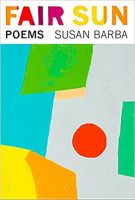April 22, 2017
Edited by David Sanders
Specimen Days
1672 Georg Stiernhielm, Swedish scholar/author/poet (Hercules), dies at 73.
1699 Hans A baron von Abschatz, Silesian poet, dies at 53.
1788 Zacharias H Alewijn, Dutch poet, dies 46.
1816 Philip James Bailey, English poet (Festus), is born.
1905 Robert Choquette, French Canadian novelist, poet and diplomat (d. 1991), is born.
1914 Charles Hubert Sisson, author/poet (Christopher Homm), is born.
1920 Jos de Haes, Flemish philological/poet (Misery of the Word), is born.
1943 Louise Glück, American poet and 12th US Poet Laureate, is born.
1951 Ana María Shua, Argentine poet, is born.
1957 Ignatius Roy D Campbell, British poet (Garcia Lorca), dies at 54.

The Lovers
They always talked of being reincarnated so that they could kiss in public. They died together, in an accident, during a clandestine encounter. He was reincarnated as a circus elephant and she as a petunia. The life of a petunia is very brief, which put them out of sync. In the following reincarnation, both were human, with sixty-three years between them. She became Pope and he a darling little girl who was permitted to kiss the papal ring during an audience.
—Ana María Shua
trans. Stephen J. Stewart
“They always talked of being reincarnated so that they could kiss in public.” – Ana María Shua
World Poetry
Saudi Poet Who Criticized Security to Be Imprisoned
A counterterrorism court in Saudi Arabia has sentenced a poet to two months imprisonment for poetry deemed insulting to security officials. The state-linked Saudi Okaz reported Thursday that the poet, whose name was not published, had shared the poem on Twitter and YouTube. The news website says the Specialized Criminal Court in the capital, Riyadh, found the Saudi poet guilty of producing and publishing material that was disrespectful to security officials and that could harm public order.
Meet the Finalists for the Griffin Poetry Prize

The eight finalists for Canada’s Griffin Poetry Prize, one of the most lucrative and highly regarded awards of its kind, were announced on Tuesday. The winners of the two prizes – which recognize the best books of poetry published in Canada and abroad – each receive $65,000.
The eight finalists for Canada’s Griffin Poetry Prize, one of the most lucrative awards of its kind, were announced on Tuesday.
Recent Reviews
The Unaccompanied by Simon Armitage Review – Luminous and Unsettling
Snowmen and bargain shops take an unexpected twist in this powerful collection about a world in meltdown
by Kate Kellaway
Simon Armitage’s work is earthed – no matter what he is writing about, his poetry is never shallow-rooted. Nothing he writes is pretentious, footling or airy-fairy. Part of this stems from his reassuring Yorkshire tone – it is calming, it holds things together, it promises a degree of common sense. But in his 11th collection, however safe the hands, the subject matter is anything but reassuring. Many poems describe an endangered world. The collection opens with Last Snowman, in which a mournful grotesque floats “down an Arctic seaway” complete with red scarf, clay pipe and “a carrot for a nose/(some reported parsnip)”.
In Coleridge’s Bed
by Ange Mlinko
Why should poets’ deaths carry more weight than those of others? David Markson’s litany of deaths, This Is Not a Novel, starts off with a poet’s death (Byron’s) and expands to commemorate, in laconic sentences and judicious fragments, the deaths (sprinkled with quotes and quirks) of novelists, painters, composers, philosophers. As it turns out, you’re not really famous until you’ve left a written trace (‘Hitler typed with two fingers’). But as Markson winds to a close, he rounds back to the poets.
Why should poets’ deaths carry more weight than those of others? David Markson’s book This Is Not a Novel begins with Byron’s death.
Broadsides
Petitions and the Power of Poetry
by Eric Weiskott
As an English professor and a poet, I face this question every day. The death of poetry would put me out of a job. Each year, I teach a required seminar called Studies in Poetry, in which I must convince a new group of Boston College sophomores that poetry matters in the English major and in life. Although they’d never say it, many students probably enter the class wishing they did not have to take it. My job is to change their minds.
Why We Need Mary Oliver's Poems
When arguments fail us, we turn to words of wonder.
by Debra Dean Murphy
People are hungry for poetry these days. I have found this to be true in my own life, and I experience it among friends and acquaintances whose sensibilities track along the spectrum from deep religious conviction to belief in nothing much at all. For theology and liturgy, poetry has always mattered. Scripture begins and ends with poetry and contains swaths and snatches of it throughout its vast remainder. The rites of Christian worship across the centuries have endured in part because they are poetry in the mouth, poetry in the ear, poetry to live by. Accomplished poets with theological acumen have always helped to sustain the piety of the faithful: Ephrem the Syrian, Hildegard of Bingen, Dante Alighieri, George Herbert, Christina Rossetti, T. S. Eliot, Gerard Manley Hopkins—to name only a few.
Mrs. Custer’s Tennyson
by William Logan
On Elizabeth & George Custer’s experience with Tennyson’s works.
Those who read with pen in hand form a species nearly extinct. Those who read the marginal notes of readers past form a group even smaller. Yet when we write in antiphonal chorus to what we’re reading, we engage in that conversation time and distance otherwise make impossible. Coleridge, one of the most obsessive of marginal annotators, those graffiti artists of the book, was so addicted to the practice that any book borrowed became a hostage to fortune. If he ever managed to return it, the margins were likely to be heavily defaced—he crowded his arguments into the forum of the side aisles.
Those who read with pen in hand form a species nearly extinct. Those who read the marginal notes of readers past form a group even smaller.
Drafts & Fragments
Davies’s Emily Dickinson Film Is a Fine and Furious Work of Art
by Armond White
Terence Davies’s A Quiet Passion has an impossible heroine — the poet Emily Dickinson. With his signature concentration, gravity, and beauty, Davies tells her story of spinsterhood and genius in Amherst, Mass., where she lived around the time of the Civil War. The film is not simply a biopic; it’s also an emotional autobiography, as are all Davies’s films, from last year’s Sunset Song on to The Deep Blue Sea, Of Time and the City, The House of Mirth, The Neon Bible, his family chronicles Distant Voices, Still Lives and The Long Day Closes, and his debut Trilogy, which depicted his struggle with Catholicism and sexuality.
The Poetic Intimacy Of Administering Anesthesia
by Meredith Rizzo
According to Audrey Shafer, there is something profound in the moment a patient wakes up from surgery. She would know — she's an anesthesiologist. She's responsible for people when they are at their most vulnerable: unconscious, unable to breathe on their own or even blink their eyes. As a result, Shafer says, a kind of intimate trust forms between her and her patients. It's this closeness that moves her to write poetry about medicine.
Terence Davies’s film A Quiet Passion has an impossible heroine — the poet Emily Dickinson.
Poetry In the News
Unseen Sylvia Plath Letters Claim Domestic Abuse by Ted Hughes
Sylvia Plath alleged Ted Hughes beat her two days before she miscarried their second child and that Hughes wanted her dead, unpublished letters reveal. The two accusations are among explosive claims in unseen correspondence written in the bitter aftermath of one of literature’s most famous and destructive marriages.
Using Haiku, More than 200 Poets Pay Tribute to Obama
More than 200 poets are writing a “Renga for Obama,” a celebratory ode to the 44th president, which is published in the Harvard Review. The “Renga for Obama,” which is curated and edited by poet Major Jackson, is crafted in a traditional Japanese form of poetry, in which poets working in pairs compose a “tan-renga” of two stanzas of poetry.
Sylvia Plath alleged Ted Hughes beat her two days before she miscarried their second child, unpublished letters reveal.
New Books
The Last Troubadour: New and Selected Poems by David St. John
[Hardcover] Ecco, 192 pp., $25.99

In The Last Troubadour, David St. John has given us a collection of new and selected poems of astonishing beauty, precise and keenly observed but also touched with sensuality and deep feeling. Nothing is too small to escape notice (in “Guitar” St. John reflects on the beauty of that word) or too large to be explored-the suicide of a friend, the illness of a lover, or the texture of longing and desire. A sharp observer of landscapes within and without, St. John directs his empathetic gaze and vivid, inventive voice to investigating both the darkest and the most inspiring parts of being human, the small moments between friends and lovers as well as the groundswells that alter lives.
Tumbling Toward the End by David Budbill
[Paperback] Copper Canyon Press, 110 pp., $17.0
Appearing frequently on Garrison Keillor's The Writer's Almanac, David Budbill's poems are deceptively simple and filled with light and longing. In this new book, he confronts the painful realities of aging, with both joy and mortality interweaving his sparse and brisk poems. Eschewing platitudes and easy answers, Budbill achieves a dynamic and delicate balance between deepening winter and filling out the seed-catalog order for the next garden.
Fair Sun by Susan Barba
[Paperback] David R Godine, 88 pp., $17.95

The three interrelated sections of poetry in Fair Sun explore the primary importance of connection, both with other human beings and with the natural world. In the first section, the poems are wide-ranging in locale and reference, exploring the acquisition of language, specifically the ways in which the experience and distance embedded in language darken and threaten the edenic, prelapsarian qualities of a childhood spent close to the natural world. There are poems that enact the sudden possibilities of speech, the complexities of translation, the bewilderment of the bilingual speaker, both fluent and tongue-tied.
Night Vision by John Foy
[Hardcover] St. Augustines Press, 80 pp., $22.00
In John Foy's Night Vision, wars go on in the Middle East, violence is never far away, and the creatures of the field are “much the worse / for having been beneath the rotor blades.” Written in an uncluttered idiom, these poems, technically adept, play across a range of forms in a voice that stands out for its bitter clarity and directness. They are by turns contemplative and savage, invoking Meister Eckhart but acknowledging that “we die like dogs in the deep snow.” If they offer solace at all, it’s in a plainspoken, dark humor. The result is an emotional immediacy unique in American poetry.
Standing Water: Poems by Eleanor Chai
[Paperback] Farrar, Straus and Giroux, 112 pp., $14.00

The poetry in Fair Sun explores importance of connection, both with other human beings and with the natural world.
Correspondences
An Interview with Tarfia Faizullah
Jonathan Hobratsch

Tarfia Faizullah was born in Brooklyn, NY. She is the author of Seam (SIU 2014) and Registers of Illuminated Villages (Graywolf, 2018). Her poems have received multiple awards, been published widely in periodicals and anthologies both in the United States and abroad, and have been translated into multiple languages. In 2016, she was recognized by Harvard Law School as one of 50 Women Inspiring Change. Tarfia currently teaches in the University of Michigan Helen Zell Writers’ Program as the Nicholas Delbanco Visiting Professor in Poetry. She still believes in true love.
Not Settled: An Interview with Adam Zagajewski
Zagajewski consistently writes with lightness, wit, and a dry sense of irony that never shades into cynicism or self-satisfaction.
by James Gibbons
“All systems are finally a mental poison, the rotten apples of the mind’s life,” writes the Polish poet Adam Zagajewski in his most recently translated book of prose, Slight Exaggeration. Zagajewski’s emphatic rejection of any system is reflected in the book’s flexible form, which consists of a scrolling stream of fragments, often brief and not unlike those of a journal, though he also permits himself more extended considerations. Written between late 2008 and 2010, Slight Exaggeration offers a bracingly proximate encounter with Zagajewski’s thinking as he moves among various speculative preoccupations. There’s a nearly peripatetic sense of the poet’s mind as it searchingly makes its way, never haphazardly but without ever showing a desire to resolve the existential tensions made manifest in his consciousness. “We must live in doubleness, in difficult, impossible doubleness,” he observes.
Tarfia Faizullah was born in Brooklyn, NY. She is the author of Seam (SIU 2014) and Registers of Illuminated Villages (Graywolf, 2018).
Envoi: Editor’s Notes
Lessons from the Past: Mary Oliver
"I never had any other notion than that the eye/I of the poem should be not the writer of the poem but the reader of the poem, and that was the point; it's not that I care whether I'm a male voice speaking or a female voice speaking—or anything on a this-world basis—it's that I believe very much and always have that readers want poems that will bring them news of their lives, not news of the poet's life. And this comes past all the traditions of Plath and Lowell and Sexton and et cetera, which I don't find nourishing work. I find it technically brilliant and about as impressive as a hurricane, but it certainly doesn't bring me much information about myself, and I'm not so sure how reliable it is about the self that's speaking."
—from An Interview with Mary Oliver by Renee Olander in The Writers Chronicle
“I never had any other notion than that the eye/I of the poem should be not the writer of the poem but the reader.” – Mary Oliver